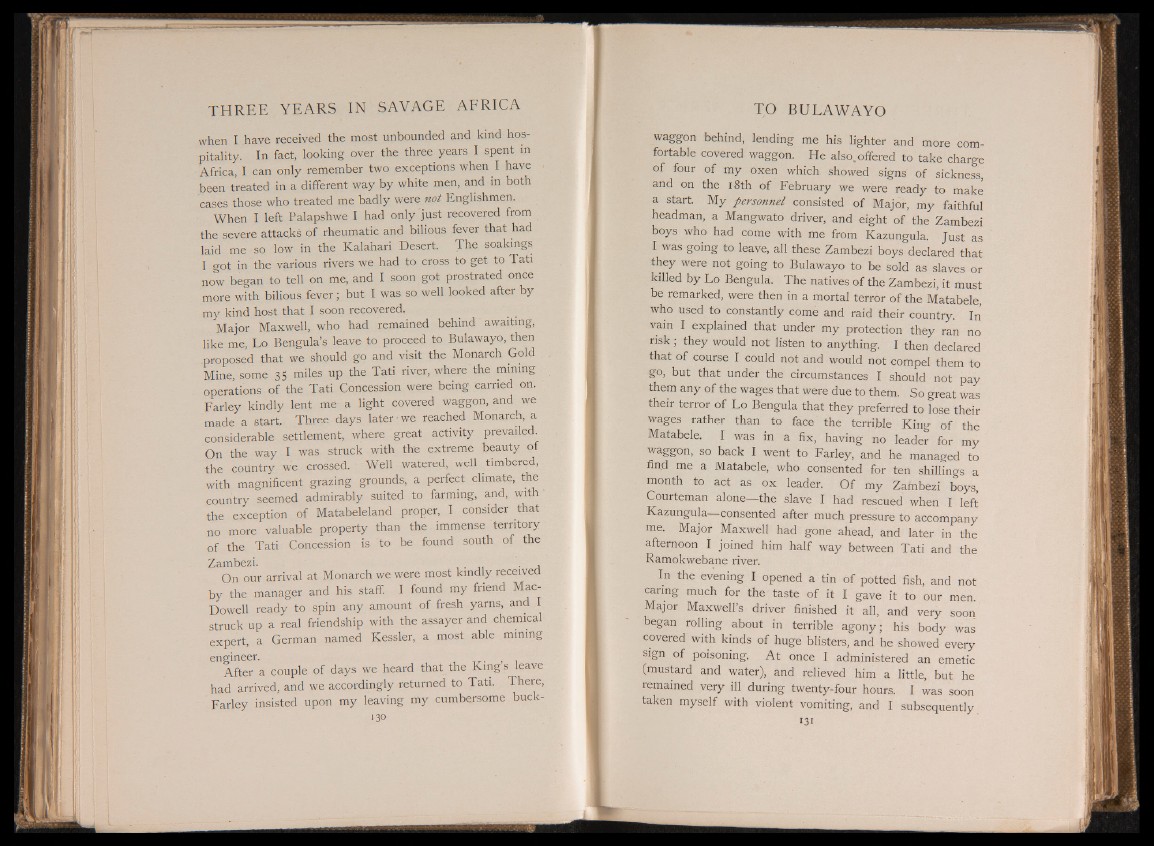
when I have received the most unbounded and kind hospitality.
In fact, looking over the three years I spent in
Africa, I can only remember two exceptions when I have
been treated in a different way by white men, and in both
cases those who treated me badly were not Englishmen.
When I left Palapshwe I had only just recovered from
the severe attacks of rheumatic and bilious fever that had
laid me so low in the Kalahari Desert. The soakings
I got in the various rivers we had to cross to get to Tati
now began to tell on me, and I soon got prostrated once
more with bilious fever; but I was so well looked after by
my kind host that I soon recovered.
Major Maxwell, who had remained behind awaiting,
like me, Lo Bengula’s leave to proceed to Bulawayo, then
proposed that we should go and visit the Monarch Gold
Mine, some 35 miles up the Tati river, where the mining
operations of the Tati Concession were being carried on.
Farley kindly lent mer a light covered waggon, and we
made a start. Three days later-we reached Monarch, a
considerable settlement, where great activity prevailed.
On the way I was struck with the extreme beauty of
the country we crossed. Well watered, well timbered,
with magnificent grazing grounds, a perfect climate, the
country seemed admirably suited to farming, and, with
the exception of Matabeleland proper, I consider that
no more valuable property than the immense territory
of the Tati Concession is to be found south of the
Zambezi. . .
On our arrival at Monarch we were most kindly received
by the manager and his staff. I found my friend Mac-
Dowell ready to spin any amount of fresh yarns, and I
struck up a real friendship with the assayer and chemical
expert, a German named Kessler, a most able mining
engineer.
After a couple of days we heard that the King s leave
had arrived, and we accordingly returned to Tati. There,
Farley insisted upon my leaving my cumbersome buckwaggon
behind, lending me his lighter and more comfortable
covered waggon. He also, offered to take charge
of four of my oxen which showed signs of sickness,
and on the 18th of February we were ready to make
a start My personnel consisted of Major, my faithful
headman, a Mangwato driver, and eight of the Zambezi
boys who had come with me from Kazungula. Just as
I was going to leave, all these Zambezi boys declared that
they were not going to Bulawayo to be sold as slaves or
killed by Lo Bengula. The natives of the Zambezi, it must
be remarked, were then in a mortal terror of the Matabele,
who used to constantly come and raid their country. In
vain I explained that under my protection they ran no
risk; they would not listen to anything. I then declared
that of course I could not and would not compel them to
■go, but that under the circumstances I should not pay
them any of the wages that were due to them. So great was
their terror of Lo Bengula that they preferred to lose their
wages rather than to face the terrible King of the
Matabele. I was in a fix, having no leader for my
waggon, so back I went to Farley, and he managed to
find me a Matabele, who consented for ten shillings a
month to act as ox leader. Of my Zambezi boys,
Courteman alone—the slave I had rescued when I left
Kazungula—consented after much pressure to accompany
me. Major Maxwell had gone ahead, and later in the
afternoon I joined him half way between Tati and the
Ramokwebane river.
In the evening I opened a tin of potted fish, and not
caring much for the taste of it I gave it to our men.
Major Maxwell’s driver finished it all, and very soon
began rolling about in terrible agony; his body was
covered with kinds of huge blisters, and he showed every
sign of poisoning. At once I administered an emetic
(mustard and water), and relieved him a little, but he
remained very ill during twenty-four hours. I was soon
taken myself with violent vomiting, and I subsequently